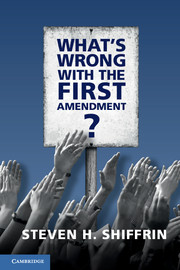6 - Commerce
from PART I
Published online by Cambridge University Press: 05 September 2016
Summary
For most of the history of the United States, commercial speech in general and commercial advertising in particular has been bereft of constitutional protection. Commercial advertising has no obvious connection to democratic life. Instead, advertising ordinarily involves corporations seeking to promote their products by manipulating consumers with irrelevant, nonverifiable, noninformational appeals, appeals frequently designed to attach an erotic connection (created out of whole cloth) to their message. Nor is this a new phenomenon. About the period from 1880 to 1930, T. J. Jackson Lears writes: “[T]herapeutic advertising became a method of social control – a way to arouse consumer demand by associating products with imaginary states of well-being.” To make matters worse, commercial advertisers frequently corrupt the communications media in which their advertisements appear by insisting that material be sanitized in ways that will offer a noncontroversial home for their products or a place free of material that might otherwise threaten their profitability.
Of course, commercial advertising serves an economic purpose in creating demand, and it is understandable why, in the absence of more explicit fraud and deception, a legislature would decline to regulate. But it is unclear why this deluge of manipulation should enjoy constitutional protection. Indeed, whatever the economic advantages associated with commercial advertising, it comes with cultural and political costs.
When US advertisers spend in excess of $180 billion dollars on media advertisements in a single year, they inevitably promote a materialistic, hedonistic culture. It encourages human beings in that culture to focus on possessing objects (and to revel in sensations) at the center of their lives. This conception of the good life might comport with the crassest form of hedonism, but there is more to life than pleasure seeking including the serving of others, the nurturing of relationships, the cultivation of character, and the development of a mature personality. In the end, it is preposterous to suppose that human beings achieve their dignity by securing material goods. What John Dewey observed is certainly true – at least at funerals, “We praise even our most successful [people], not for their ruthless and self-centered energy in getting ahead, but because of their love of flowers, children, and dogs.”
- Type
- Chapter
- Information
- What's Wrong with the First Amendment , pp. 79 - 94Publisher: Cambridge University PressPrint publication year: 2016



